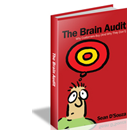
Imagine you had a handicapped child.
And now this child is twenty years old and reasonably self-sufficient. Self-sufficient enough for you to decide you want to get back in the work force.
But twenty years have passed.
What will you do? Your qualifications are worthless. Your experience doesn't count for much. And you're intimidated as hell.
So let's start with what you know.
What you do know is how to care for a handicapped child. You know what that child needs in their first year.
Their second year; fifth year; seventh year; nineteenth year. You know what it is to be a parent of that child.
What you have is ‘most-wanted' information.
So what is ‘most-wanted’ information?
Um, it's kind of self-explanatory, but let's explain it anyway. ‘Most-wanted' information is simply a tiny slice of information that's of great value to a potential audience. It's not the entire saga of what you know. It's just a tiny, tiny bit.
So let's take an example: Let's say you're in business.
What kind of information would be of extreme value to you?
You'd be interested in marketing strategy, sales letters, websites, and blah-dee-blah-dee-blah.
But that's the whole saga. What if I avoided the saga, and gave you just ‘most-wanted' information?
Information on a niche of a topic.
Like ‘pricing', for example.
What if I were to say to you, that you could get a document/audio/video/ or even a bunch of ideas scribbled on a napkin.
And those ideas enabled you to:
1) Get the prices you want.
2) Test if the prices were right for the market.
3) Increase the prices of your product/service as many as thrice a year, and never lose customers.
Would you be interested?
Oh sure you would. Because that factor of pricing bzzzzzzs around in your brain. And you figure, if you could find a way to increase prices without losing customers, aha, that would be nice.
And the best part of most-wanted information is that it's unique, because it's a tiny, tiny piece of advice.
So let's take another example:
For example, there was a shopkeeper who could tell you if your employees were stealing from you. He put this information on ‘How to Spot (And Stop) Thieving Employees.'
The audio on tape–yes, back in the good ol' days it was ‘tape–was less than 15 minutes long. The text feature was a handy reference card. Yup that was it. And he sold it for $200.
So why would a customer pay $200 for a 15-minute blab, and a reference card?
That customer sees the $200 price tag, but also sees the danger of thieving employees. Thieving employees can not only siphon off more than $200, but can encourage others to do the same. Or at the very least, reduce morale in a store.
So the ‘most-wanted' information became valuable. As valuable as the mother of the handicapped child telling you how to ‘bypass medical red-tape.'
Or who grows hundreds of tomatoes from just four plants, in a tiny square patch in your backyard.
Or the ‘audio-guy' who teaches you how to ‘correctly compress files' and avoid the volume making unwanted leaps and drops.
‘Most-wanted' information doesn't have to 100 pages to start
When we started out our business, we had a concept in our head. That concept was the Brain Audit. When I first put it down on paper, it amounted to sixteen measly pages.
But it was ‘most-wanted' information. And sixteen pages were all I could fill. Today, those sixteen pages have grown into a website, blog, and a very detailed book.
But I too was ‘handicapped' when I started out. I didn't know that much about marketing. All I had was these measly sixteen pages.
And all you probably have are nine pages. All that mother of the handicapped child has is probably six pages.
But six pages of ‘wanted-information' are what's critical.
And the information you have, would be of extreme interest to someone else who has a handicapped child. And just like you, that parent has to deal with a range of emotions, and real-life issues of bringing up a handicapped child.
Do you think that parent would want advice? Do you think that parent would want empathy? Do you think that parent would want you to give as much detail as you possibly could, to bring up their child the way you have?
And more importantly, if you were that parent, would you pay $100 a year to get the information you so desperately seek? Across the planet, guess how many handicapped children are born every day.
Guess how many of those parents would gladly pay $100 a year to get informed? And guess how much $100 x 1000 amounts to per year?
But, but, but, but, but…you say
I know. You're not confident anyone would buy your information. And heck, there's no way out of this confidence issue other than to simply sell what you know.
Selling your information, leads people to buying. And buying leads to feedback and experience.
And of course, confidence. Because confidence can't be bought. Or taught.
There's really no shortage of people who want to write a book; a play; a movie.
The reason why they never get started is because they are trying to create a big production.
What you need isn't a production, its ‘most-wanted' information. It could be twenty minutes of audio. Ten pages of text. Thirty seconds of video. The ‘most-wanted' information not only creates a stream of income, but also sets you out as the expert. An expert who clients turn to when they want even more ‘most-wanted' information.
Even if it's scribbles on the back of a napkin.
P.S. Do you have a question or comment? Write it here and I will respond
| Are you losing tons of potential business because you don't know how the brain works? Read how The Brain Audit can help you.
“I'm one of those people who has a lot of trouble spending money on training and education, so paying a fee to join a forum was a big step for me.” What I've found, though, is that people are serious and they contribute. That makes a big difference. I'm also enjoying the general discussions. As a solo entrepreneur, most of my days are spent in isolation. And because of where I live, I'm not around other similarly-minded folks. The forum is Thanks for your work to keep this forum going. Joe Thoron, Eastsound, WA, USA
|
Top Selling Products Under $50
1) You already know that 80% of a sales letter depends on your headline.
So what's the remaining 20% that causes customers to buy? Find out more
2) Do You Often Hit A Wall Called ‘Writers Block'?
Learn how the core elements of outlining can save you from the misery of writing your next article.
3) Do you know that visuals immediately improve your sales conversion?
Learn how to create drama and curiosity and help improve your web page conversion with visuals.
4) Do your websites, brochures, presentations, etc… confuse your clients?
Put some sanity into your design, even though you are not a designer?
5) Chaos Planning
Year after year you sit down and create a list of things you want to achieve. Then suddenly it's April, and you've not really moved ahead as you'd expected.
Learn Why Most Planning Fails: And The Critical Importance of Chaos in Planning.
The Black Belt Presentation Series: Learn how to make your Presentation stand out from every other presenter.
[next_step]



Good morning Sean!
What you say is so true. I knew nothing about the topic I chose to write about, but had to write about it anyway for business purposes. A ‘do or die’ situation (for the business, not me!).
From nothing the blog was created; from the blog contacts were made and opportunities presented that I had never considered; from those contacts and opportunities came confidence – next will come the book (s).
And the really good news is that from the contacts and opportunities I have confidence that the books will sell – maybe not A list books, but books I know people are looking for.
I share your view that people have ‘most-wanted’ information, but just don’t realise it – or how valuable it can be to others and themselves.
I did this! I think.
I self-published a 46 page book “How to Reap the Most From What You Sow” wish is a compilation of very concise, easy steps to take to increase the harvest.
I felt guilty asking $11.99- my husband said I should charge much more (30 years of hands on gardening experience, capsulized).
I want to do more How-to manuals of this type. Is this what you mean?
Or did I miss the point?
Thanks so much for all your articles- this old gray head is learning new tricks
~GJ.
No you didn’t miss the point. And it’s possible that you could charge more. It depends on what you’re offering. And you can’t compare it with what’s out there that may be cheaper. If you can get me to do something in a simpler or quicker way, I may pay more for less—as long as it’s to the point.
Sean — This is so informative and relative — it defines where Knowledge is something learnt — but experience is what is need in a form that individulas can relate to — Thank you so much — One of your best articles to date
John B.
You’re welcome, John. 🙂
Thanks Linda 🙂 I used to make the same mistake before. I thought my information wasn’t valuable enough.
Thanks, Sean. From my experience of buying books and other information, you’re right. People will pay for specific information that they need.